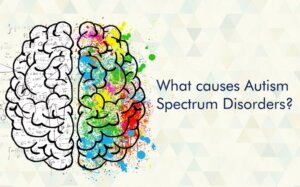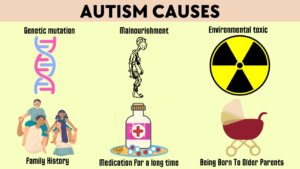 (2020)
(2020)
Autism Spectrum Disorder (ASD) is a neurodevelopmental condition frequently identified in early childhood. According to the Center for Disease Control and Prevention (CDC), 1 in every 36 children in the United States are diagnosed with autism (CDC, 2022). Early indicators of autism include speech delays, decreased social-communicative skills, repetitive behaviors, and difficulties with changes in routines (CDC, 2022). Although autism has become more prominent in the general population, scientists and researchers have yet to determine a single conclusive cause of the disorder. Because the cause of autism is not yet clear, theories and rumors have spread throughout popular media about what factors increase the likelihood of a child developing autism, as well as the likelihood of having the disorder. Rumors that childhood vaccines are responsible for the increased occurrence of autism have been circulating since the late 1990’s (Tanner & Dounavi, 2020). More recently, social media platforms like TikTok have given way to trends like “self-diagnosing” where young people and adults create videos about how they have diagnosed themselves with autism because they feel as though they meet the criteria. As the frequency of autism increases within our population and awareness increases within our society, it is only natural that people want to seek information about what autism is and what causes it. It is important that everyone seeking information about autism has access to the most factual and up-to-date information.
What is Autism? How is it Diagnosed?
Autism is a developmental disability characterized by difficulties with speech and language, social skills, repetitive behaviors, and limited interests. Autism is a spectrum, and people with the disorder will have varying symptoms and severity (CDC, 2022). Symptoms of autism usually begin to become apparent between 6-12 months of age and children can be diagnosed as early as when they are 18 months old (Ritchler et al., 2006). Only specialized doctors like pediatric neurologists, developmental pediatricians, and clinical psychologists can diagnose autism (CDC, 2022). If there are concerns that a child may have autism, their pediatrician should refer them for a comprehensive evaluation. An evaluation for autism consists of psychological testing, observation, an extensive developmental and medical history review, and additional medical testing to rule out any other conditions that could be causing similar symptoms (Ritchler et al., 2006)..
Do Vaccines Cause Autism?
Vaccines do not cause autism. In the late 1990’s, a pediatric gastroenterologist published a study that claimed that Thimerosal, an ingredient used in the Measles-Mumps-Rubella childhood vaccine, is responsible for the onset of autism (Tanner & Dounavi, 2020). This study was highly flawed and unethical and was quickly debunked by other studies. The doctor who published this claim soon lost his medical license because of his negligence (Tanner & Dounavi, 2020). Despite this, some critics, including the celebrity Jenny McCarthy, have been outspoken about their beliefs that vaccines cause autism (Hall, 2024). As a measure of precaution, and to encourage parents to continue to vaccinate their children against communicable diseases, Thimerosal was removed from the Measles-Mumps-Rubella vaccine in 2004 (Tanner & Dounavi, 2020). Despite the removal of Thimerosal almost 20 years ago, the prevalence of autism has continued to rise in the United States and among the global population (Tanner & Dounavi, 2020). Another reason why misinformation about autism and vaccines has continued to circulate is because it was once believed that developmental regressions (loss of expressive language skills, eye contact, etc.) are a symptom of autism. Parents would report that their child would begin to “lose skills” and the “onset” of autism would begin around 9-12 months, which happens to coincide with the timing for many childhood vaccines (Ritchler et al., 2006). This phenomenon has been heavily studied by researchers and it has been concluded that there is no evidence that the Measles-Mumps-Rubella vaccine causes developmental regressions. Research has found that young infants who have gone on to receive autism diagnoses as they got older were showing traits and characteristics of autism before they ever even received the Measles-Mumps-Rubella vaccine (Ritchler et al., 2006).
What Does Cause Autism?
There is not currently a singular or definitive cause of autism. Scientists, doctors, and other researchers have identified factors that increase the likelihood that a child will develop autism. These factors include genetics, environmental toxins, family history, prematurity, complications at birth, and advanced maternal and paternal ages (CDC, 2022). Further research is being done to continue to get a better understanding of how and why autism is developed. Environmental toxins like air pollution, pesticides, lead, heavy metals, prenatal medication use, and malnutrition have all been identified as contributing factors to the increased occurrence of autism (US Department of Health & Human Services, 2023).
 (2022)
(2022)
Autism is a complex disorder that has become increasingly more prevalent in our society. Despite there not being a singular reason for developing the condition, many biological and environmental factors impact the likelihood of a child developing the disorder. While autism research is always ongoing, current research has found that there is no connection or correlation between the development of autism and childhood vaccines. Autism is a complex condition that can only be diagnosed by a licensed medical doctor or clinical psychologist. If you are concerned that your child may have autism, contact your pediatrician for a referral for a comprehensive medical and psychological evaluation.
References
Centers for Disease Control and Prevention. (2022, December 9). What is autism spectrum disorder?. Centers for Disease Control and Prevention. https://www.cdc.gov/ncbddd/autism/facts.html
Dr. Chhabra Healthcare (2022) Autism Causes Autism Symptoms, Causes, and Treatments
Retrieved from https://drchhabrahealthcare.com/disease/autism-homeopathy-treatment/
Hall, E. (2014, April 14). 11 things that Jenny McCarthy has said about vaccines. BuzzFeed News. https://www.buzzfeednews.com/article/ellievhall/11-things-that-jenny-mccarthy-has-said-about-vaccines
Healis Autism Centre. (2020). “What Causes Autism Spectrum Disorder?” What are the Causes for Autism? Retrieved from https://www.healisautism.com/post/causes-for-autism.
Richler, J., Luyster, R., Risi, S., Hsu, W.-L., Dawson, G., Bernier, R., Dunn, M., Hepburn, S., Hyman, S. L., McMahon, W. M., Goudie-Nice, J., Minshew, N., Rogers, S., Sigman, M., Spence, M. A., Goldberg, W. A., Tager-Flusberg, H., Volkmar, F. R., & Lord, C. (2006). Is there a ‘regressive phenotype’ of autism spectrum disorder associated with the measles-mumps-rubella vaccine? A CPEA study. Journal of Autism and Developmental Disorders, 36(3), 299–316. https://doi.org/10.1007/s10803-005-0070-1
Tanner, A., & Dounavi, K. (2020). The emergence of autism symptoms prior to 18 months of age: A systematic literature review. Journal of Autism and Developmental Disorders, 51(3), 973–993. https://doi.org/10.1007/s10803-020-04618-w
U.S. Department of Health and Human Services. (2023). Autism. National Institute of Environmental Health Sciences. https://www.niehs.nih.gov/health/topics/conditions/autism/index.cfm#:~:text=What%20Causes%20Autism%3F,autism%2C%20implying%20a%20genetic%20component.
YouTube. (2021). What is Autism? | Quick Learner. YouTube. Retrieved November 15, 2023, from https://www.youtube.com/watch?v=TJuwhCIQQTs.

This was a very informative and concise blog that discusses the theory that vaccinating your children will increase the likelihood of developing autism. This theory could not be farther from the truth and you did a wonderful job debunking the false claims. Autism is a misunderstood and mysterious disorder and until scientists can definitively prove how and why some children develop the disorder, there will always be conspiracy theorists putting the blame somewhere without any evidence to back their claims. Even after researchers have identified factors that could increase the likelihood of a child developing Autism, such as genetics, environmental factors, family history, etc. there are still a percentage of individuals who want to connect vaccinations to Austism.
Good job!
Hi Brianna,
You have done a great job presenting this information. It was an engaging topic for me, as I work with children who have been diagnosed with ASD. There are often numerous myths and speculations surrounding the increase and risk factors associated with this disorder. I appreciate that the information you provided was concise, clear, detailed, and up-to-date, with references to the CDC. I particularly liked how you bolded the facts about what causes ASD, allowing readers to easily identify and focus on this important information.
Hi Brianna!
I really enjoyed reading your blog post!The question of whether or not vaccines cause autism has been relevant in the last few years related to the COVID pandemic.I like that you directly addressed this question and clearly state vaccines do not cause autism. The most interesting part about this myth is that it all started with one doctor’s false claims. I can’t believe that it has developed into this massive conspiracy. You did a wonderful job explaining the origin of this claim as well as proving it wrong. I like that you included a section that addressed the possible “causes” for autism. Although there is no specific cause, I think it is interesting how so many environmental factors can increase the likelihood of a child developing autism. Overall I really enjoyed your blog. Great work!